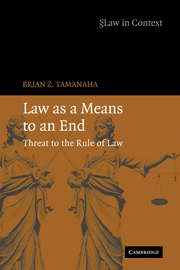Book contents
- Frontmatter
- Contents
- Acknowledgments
- Introduction
- Part 1 The spread of legal instrumentalism
- Part 2 Contemporary legal instrumentalism
- 6 Instrumentalism in legal academia in the 1970s
- 7 Instrumentalism in theories of law
- 8 Instrumentalism in the legal profession
- 9 Instrumentalism of cause litigation
- 10 Instrumentalism and the judiciary
- 11 Instrumentalism in legislation and administration
- Part 3 Corroding the rule of law
- Epilogue
- Index
- Titles in the series
8 - Instrumentalism in the legal profession
Published online by Cambridge University Press: 25 July 2009
- Frontmatter
- Contents
- Acknowledgments
- Introduction
- Part 1 The spread of legal instrumentalism
- Part 2 Contemporary legal instrumentalism
- 6 Instrumentalism in legal academia in the 1970s
- 7 Instrumentalism in theories of law
- 8 Instrumentalism in the legal profession
- 9 Instrumentalism of cause litigation
- 10 Instrumentalism and the judiciary
- 11 Instrumentalism in legislation and administration
- Part 3 Corroding the rule of law
- Epilogue
- Index
- Titles in the series
Summary
The first sentence of the rules governing the legal profession declares that the core of lawyering is a means (lawyer)–ends (client) relationship: “a lawyer, as a member of the legal profession, is a representative of clients.” It mandates that “a lawyer shall abide by a client's decisions concerning the objectives of representation.” Confirming this avowedly instrumental connection, the rules caution that “A lawyer's representation of a client … does not constitute an endorsement of the client's political, economic, social or moral views or activities.” The implicit point is that serving as a tool to advance a client's perhaps immoral ends does not make the lawyer immoral. Legal practice is infused with an additional sense of instrumentalism: lawyers take an instrumental attitude toward law itself, wielding and manipulating legal rules and processes to advance their clients' goals. Legal rules and mechanisms are the tools of their craft, what they operate with to get things done. Furthermore, many lawyers see the practice of law instrumentally as a means to their own enrichment and wield and manipulate legal rules and processes to further their personal ends.
Practicing lawyers have long acted instrumentally in the three respects just mentioned. The shift away from non-instrumental views of law chronicled in earlier chapters relates specifically to views expressed the legal elite: leaders of the bar, prominent judges, and legal academics. That does not mean these developments had no effect on legal practice.
- Type
- Chapter
- Information
- Law as a Means to an EndThreat to the Rule of Law, pp. 133 - 155Publisher: Cambridge University PressPrint publication year: 2006
- 1
- Cited by

